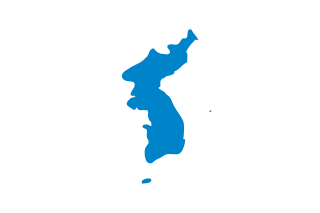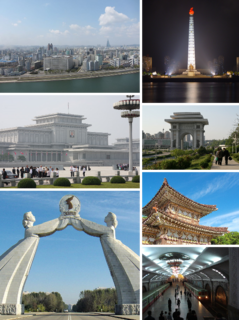
Korea is a region in East Asia. Since 1948, it has been divided between two distinct sovereign states: North Korea and South Korea. Korea consists of the Korean Peninsula, Jeju Island, and several minor islands near the peninsula. Korea is bordered by China to the northwest, Russia to the northeast, and neighbours Japan to the east by the Korea Strait and the Sea of Japan.

The Korean War was a war between North Korea and South Korea. The war began on 25 June 1950 when North Korea invaded South Korea following a series of clashes along the border.

North Korea, officially the Democratic People's Republic of Korea, is a country in East Asia constituting the northern part of the Korean Peninsula, with Pyongyang the capital and the largest city in the country. The name Korea is derived from Goguryeo which was one of the great powers in East Asia during its time, ruling most of the Korean Peninsula, Manchuria, parts of the Russian Far East and Inner Mongolia, under Gwanggaeto the Great. To the north and northwest, the country is bordered by China and by Russia along the Amnok and Tumen rivers; it is bordered to the south by South Korea, with the heavily fortified Korean Demilitarized Zone (DMZ) separating the two. Nevertheless, North Korea, like its southern counterpart, claims to be the legitimate government of the entire peninsula and adjacent islands.

The Korean People's Army is an institution of the Workers' Party of Korea, and constitutes the de facto military forces of North Korea. Under the Songun policy, it is the central institution of North Korean community. Kim Jong-un is its Supreme Commander and the Chairman of the Central Military Commission. The KPA consists of five branches: Ground Force, the Navy, the Air Force, the Strategic Rocket Forces, and the Special Operation Force.

South Korea, officially the Republic of Korea (ROK), is a country in East Asia, constituting the southern part of the Korean Peninsula and lying to the east of the Asian mainland. The name Korea is derived from Goguryeo which was one of the great powers in East Asia during its time, ruling most of the Korean Peninsula, Manchuria, parts of the Russian Far East and Inner Mongolia, under Gwanggaeto the Great. South Korea lies in the north temperate zone and has a predominantly mountainous terrain. It comprises an estimated 51.4 million residents distributed over 100,363 km2 (38,750 sq mi). Its capital and largest city is Seoul, with a population of around 10 million.

North Korea has a military nuclear weapons program and also has a significant quantity of chemical and biological weapons. As of 2003, North Korea is no longer a party to the Treaty on the Non-Proliferation of Nuclear Weapons (NPT). The country has come under sanctions after conducting a number of nuclear tests, beginning in 2006.

Kim Jong-il was the second leader of North Korea. He ruled from the death of his father Kim Il-sung, the first leader of North Korea, in 1994 until his own death in 2011. He was an unelected dictator and was often accused of human rights violations.

Juche is the official state ideology of North Korea, described by the government as "Kim Il-sung's original, brilliant and revolutionary contribution to national and international thought". It postulates that "man is the master of his destiny", that the Korean masses are to act as the "masters of the revolution and construction" and that by becoming self-reliant and strong a nation can achieve true socialism.

The Korean conflict is an ongoing conflict based on the division of Korea between North Korea and South Korea, both of which claim to be the sole legitimate government of all of Korea. During the Cold War, North Korea was backed by the Soviet Union, the People's Republic of China and their communist allies, while South Korea was backed by the United States and its Western allies. The division of Korea by external powers occurred at the end of World War II, starting in 1945, and tensions erupted into the Korean War, which lasted from 1950 to 1953. When the war ended, both countries were devastated, with utter destruction of much of the countries, but the division remained. North and South Korea continued a military standoff, with periodic clashes. The conflict survived the collapse of the Eastern Bloc of 1989 to 1991 and continues to this day.

The Korean Demilitarized Zone is a strip of land running across the Korean Peninsula. It is established by the provisions of the Korean Armistice Agreement to serve as a buffer zone between North Korea and South Korea. The demilitarized zone (DMZ) is a border barrier that divides the Korean Peninsula roughly in half. It was created by agreement between North Korea, the People's Republic of China and the United Nations Command in 1953. The DMZ is 250 kilometres long, and about 4 kilometres wide.
K-pop is a genre of popular music originating in South Korea. While the modern form of K-pop can be traced back to the early 90s, the term itself has been popularized since the 2000s, replacing the term Gayo (가요), which also refers to domestic pop music in South Korea. Although it generally indicates "popular music" within South Korea, the term is often used in a narrower sense to describe a modern form of South Korean pop that is influenced by styles and genres from around the world, such as experimental, jazz, gospel, hip hop, R&B, reggae, electronic dance, folk, country, and classical on top of its traditional Korean music roots. The more modern form of the genre emerged with the formation of one of the earliest K-pop groups, Seo Taiji and Boys, in 1992. Their experimentation with different styles and genres of music and integration of foreign musical elements helped reshape and modernize South Korea's contemporary music scene.

The 2018 Winter Olympics, officially known as the XXIII Olympic Winter Games and commonly known as PyeongChang 2018, was an international winter multi-sport event that was held between 9 and 25 February 2018 in Pyeongchang County, Gangwon Province, South Korea, with the opening rounds for certain events held on 8 February 2018, the eve of the opening ceremony.

The North Korea national football team represents the Democratic People's Republic of Korea in international association football and is controlled by the DPR Korea Football Association, the governing body for football in North Korea.

The Battle of Inchon was an amphibious invasion and battle of the Korean War that resulted in a decisive victory and strategic reversal in favor of the United Nations (UN). The operation involved some 75,000 troops and 261 naval vessels, and led to the recapture of the South Korean capital of Seoul two weeks later. The code name for the operation was Operation Chromite.

Human rights in North Korea are severely limited. Despite numerous rights being de jure guaranteed by the country's constitution, human rights groups such as Amnesty International and nations such as the United States have asserted that in practice, there is no de facto right to free speech, and the only radio, television, music and news providers that are deemed legal are those operated by the government. According to reports from Amnesty International and the U.S. Committee for Human Rights in North Korea, by 2017 an estimated 200,000 prisoners are incarcerated in camps that are dedicated to political crimes, and subjected to forced labor, physical abuse, execution and human experimentation.

The Korean DMZ Conflict, also referred to as the Second Korean War by some, was a series of low-level armed clashes between North Korean forces and the forces of South Korea and the United States, largely occurring between 1966 and 1969 at the Korean DMZ.

Kim Jong-un is a North Korean politician serving as Supreme Leader of North Korea since 2011 and the Chairman of the Workers' Party of Korea since 2012. Kim is the second child of Kim Jong-il (1941–2011) and Ko Yong-hui (1952–2004). The grandson of Kim Il-sung, the first leader of North Korea from 1948 to 1994, he is the first North Korean leader to have been born after the country's founding.

The North Korea women's national football team represents North Korea in international women's football. North Korea won the AFC Women's Asian Cup in 2001, 2003, and 2008.

Kim Il-sung was the first leader of North Korea which he ruled from the country's establishment in 1948 until his death in 1994. He held the posts of Premier from 1948 to 1972 and President from 1972 to 1994. He was also the leader of the Workers' Party of Korea (WPK) from 1949 to 1994. Coming to power after the end of Japanese rule in 1945, he authorized the invasion of South Korea in 1950, triggering an intervention in defense of South Korea by the United Nations led by the United States. Following the military stalemate in the Korean War, a ceasefire was signed on 27 July 1953. He was the second longest-serving non-royal head of state/government in the 20th century, in office for more than 48 years.

The 2018 North Korea–United States Singapore Summit, officially the DPRK–USA Singapore Summit, or commonly known as Singapore Summit, was a 12 June 2018 summit meeting between North Korean Chairman Kim Jong-un and U.S. President Donald Trump, held at the Capella Hotel, Sentosa, Singapore. This was the first-ever meeting between leaders of North Korea and United States. They signed a joint statement, agreeing to security guarantees for North Korea, new peaceful relations, the denuclearization of the Korean Peninsula, recovery of soldiers' remains, and follow-up negotiations between high-level officials. Both leaders also met separately with Singaporean Prime Minister Lee Hsien Loong.





















